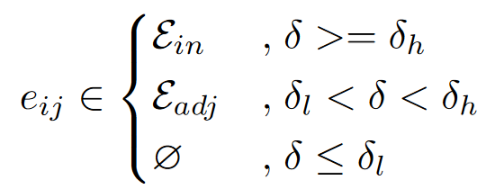Feature Matching
Feature Matching
Aim
establish correspondences between images
Approaches
Sparse Matching
Classical sparse feature matching involves detecting and describing key-points in images, followed by key-point matching.
Semi-Dense Matching
also known as the detector-free methods. These methods perform dense feature matching over the entire image and then select confident matches, which achieve impressive matching precision
Dense Matching
Dense matching methods output a dense warp with confidence map for the image pair.密集匹配方法可为图像对输出带有置信度图的密集翘曲图。
Area to Point Matching
Challenges
减少匹配冗余,因而减少去掉冗余匹配的计算(虽然因而的半句都知道,但是说出来水字数)
Researches
MESA
MESA: Matching Everything by Segmenting Anything
pipeline

首先用SAM分割,分割后的area需要进行预处理,对于面积小于Ts的和长宽比大于Tr的进行淘汰,剩下的存入候选集,然后对于候选集中的area,把它和最近的area进行合并,重复之前的检测, 直到没有area被淘汰。然后对每一个area进行level的判断(面积大小在哪个level的阈值内就是哪个level),这里的level是为后面的scale hierarchy做准备
建图:
首先是node关系的判断,计算下式,Oij是两个node的重叠面积,后面是对应的长和宽,下式计算的是重叠面积占两个node最小的面积的比值

然后进行条件判断,是包含还是邻接,或是两个node没空间关系

然后进行建图,因为SAM 本身会产生包含完整实体的区域,区域之间的包含关系很少,使用Graph Completion算法来增加,算法的核心是给每一个孤儿节点都增加双亲节点
算法实现:从最小的level开始,找所有的孤儿节点,根据他们质心的坐标cluster,同一个cluster的节点与其近邻的相应区域融合在一起,这样生成的区域containing multiple objects preserve the internal implicit semantic,并且新生成的area是一个更大level的新节点,这样再找双亲节点。对于每一个level都重复上面的操作,效果如下图
- Graphical Area Matching
